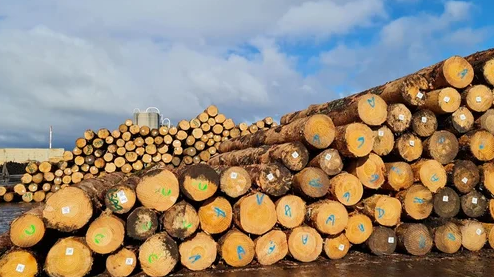
THREE KEY FACTS
* US President Donald Trump's tariffs on China have reached
145%.
* China’s demand for New Zealand logs is still strong, with
off-port uplift in the order of 70,000cu m per day in late
March.
* Currently, there is a temporary tariff exemption on New
Zealand’s forest products.
With the current US/China tariff of 145% (pick a number for what
it could be next week), it’s very likely that there will be a
significant reduction in goods manufactured in China headed to
the US – furniture included.
New Zealand-grown pinus radiata is very popular in the Chinese
furniture industry due to its properties, as it can easily be
sawn, dried, glued, laminated, painted and stained.
This sector has become more important to New Zealand as the
construction sector continues to suffer, and demand for New
Zealand radiata in construction has reduced significantly from
2021 onwards.
Having said that, China’s demand for New Zealand logs is still
strong, with off-port uplift in the order of 70,000cu m (cubic
metres) per day in late March.
On-port inventory remains a bit stubborn at a shade under 4
million cu m, however, this has reduced by 100,000cu m in the
past few weeks.
March is historically a big supply month for New Zealand and
this year was no different, with plenty of vessels on the water.
This supply, along with uncertainty in the market, has resulted
in a downturn in buyer sentiment, with April cost and freight (CFR)
prices dropping 8-10% based on March numbers.
This drop in sentiment has led to a reduction in at-wharf gate (AWG)
prices across New Zealand of around $10/JAS (Japanese
agricultural standard, a cubic-metre equivalent of log volume).
Generally, reductions are reasonably static across exporters,
however, April has seen a significant spread across the board
with reductions between $8 and $16/cu m, depending on the
exporter and the port.
The effect of tariffs on bulk shipping rates will depend on
reciprocal tariffs as the US only accounts for 2.3% of global
dry bulk demand, however, it does account for 5.7% of dry bulk
exports.
Forex has been playing the game if you’re an exporter with
fluctuations between mid $US0.55 and $US0.57.
Every cent reduction in the New Zealand dollar to the US is
around $3/cu m on the bottom line for AWG prices.
The Chinese log futures market hasn’t been terribly positive of
late, either.
After trading mostly positively since its inception, pricing has
dropped around 10% since the beginning of March, primarily due
to negative market sentiment.
Carbon prices dropped off a cliff in early March, falling from
$63/NZU to around $55/NZU by month end.
Market jitters are not helped by the likes of the Parliamentary
Commissioner for the Environment, Simon Upton, suggesting that
it was time to phase out forestry offsets for fossil fuel
emissions.
......
Click here for or the full article ->
Source:
nzherald.co.nz

